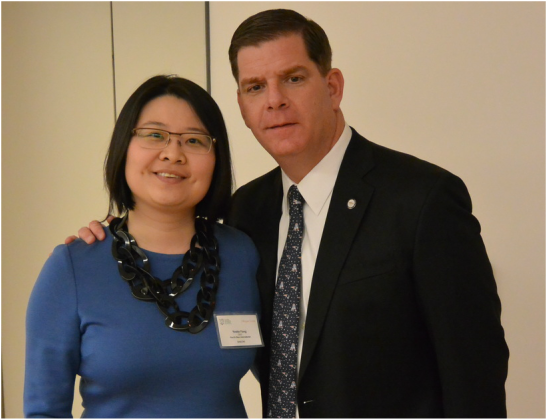 So you're getting ready to expand your business overseas. Maybe that means you're opening a new office, or maybe you're planning to negotiate with a new supplier. Either way, chances are that you're going to be flying over to meet the folks on the ground with whom you'll be working. Nothing beats a face-to-face meeting. It's critical to establishing trust and good rapport. Just be sure to do your homework so that you begin on the right foot. It can be easy to inadvertently give offense if you're not familiar with the local niceties. And unfortunately, Americans are known throughout the world for not brushing up before they visit. Just a couple of weeks ago John Kerry found himself in an awkward situation when meeting French President Holland. Mr. Kerry, in a gregarious American way, tried to hug Holland and wound up in a half-kiss half-embrace. According to The Telegraph, the French media struggled to even translate the word ‘hug.’ In Japan, it’s polite to scrutinize the business card you’re given before putting it away. If you take the card and immediately stick it in your bag you've given offense before you've even begun. And in Germany, you need to make sure you're on time for your meetings, or you give the impression that you don't think your German associates are very important. Finally, take the time to learn a little bit of the language of the country you are visiting. At least be able to say hello, goodbye, how are you, and thank you. And try to learn the standard responses to each. When I moved to Boston, I quickly learned that the query "how are you" was not meant to be a conversation opener as it was in Denver. The same sort of conventions apply in different cultures. The more effort you put in to trying to understand the local culture, the better your business will grow.
0 Comments
Increasingly the word transcreation is popping up on the internet and you may be wondering what it means. Well, building off of last week's blog, transcreation means adapting a marketing message from one language to another while keeping the tone, style, and intent the same. This generally means that marketing messages should not be translated word for word, as such a translation would result in stilted, awkward text and is likely to have diminished impact in the target market. Rather, the professional translator should read the entire text to be translated and then render it in the target language so that it accurately reflects the intentions and feel of the original.
Often transcreation will require translators to substitute different jokes, appropriate in-country slang, or modified rhymes. If your original marketing message ties into what's currently in vogue in your culture, for example with teen slang or referenced pop music, your translator will need to understand the culture of the destination language well enough to use appropriate references from that market so that the essence of the marketing message remains the same and is relevant to the local consumer. So the next time you take your marketing campaign out of country, give your translation team a little leeway to fully adapt your message to the local market. You won't get a word-for-word translation, but you will get great results. When companies translate marketing campaigns, websites, and even product manuals for use in overseas markets they walk a fine line. In addition to the straightforward translation that must occur, companies also need to adapt their materials for the local market. If the U.S. campaign features a bunch of healthy looking kids drinking milk, but in the new market kids don't drink milk, the message is not going to resonate and an opportunity will be missed. So it is essential that companies think about the local culture and how their product fits in.
Often companies need to emphasize different aspects of their products. For example, in Europe car companies may want to emphasize that they offer small, easy to park, and fuel efficient vehicles. But those same companies may need to show the U.S. market that their cars have up to date gadgets, leather interiors, and oversized sunroofs, if they are going to be successful. At the same time, companies need to find a way to be true to their brands. If their brand stands for wholesome and organic food, they need to be sure to talk about those qualities in all their markets. Otherwise, their brand will become diluted and they risk having their brand not stand for anything. The trick is to figure out what is it about your offering that all cultures want and admire--what qualities are valued across cultures that you can emphasize to create a cohesive brand strategy. Then add in those additional qualities that are unique to each country or culture. This week we were fortunate to be a sponsor of Global Business Alliance's International Business Forum, hosted in conjunction with the British American Business Council of New England.
More than 200 executives attended this informative evening to listen to Boston Mayor Marty Walsh talk about Boston's international trade ambitions and hear from industry experts Michael Klein of Tufts University and Michael Goodman of UMass Dartmouth. The room was abuzz with people discussing their overseas expansions and sharing information and advice about where the economy is headed and how best to succeed internationally. We met some great folks and had some truly insightful conversations. If you didn't get a chance to make it this year, be sure to add it to your calendar for next. It's an event not to be missed! |
Author
Archives
March 2024
Categories
All
|
Photos from : : Ys [waiz] : :, bjahind, fabola, MattysFlicks, @sage_solar, LoS, Traducción e Interpretación, Kyle Taylor, Dream It. Do It., _gee_, keepitsurreal, One Way Stock, Airviewsphotos, GotCredit, efile989, Benoit cars, ** RCB **, stephiesal853, Francisco Anzola, Highways England, ITU Pictures, VIPevent, leoplus, Karsten Bitter, Jolante, jobstop11, Nguyen Vu Hung (vuhung), jurvetson, mikefats, YooSan, sandrafdzh, roland, mikecogh, y entonces, Donald Lee Pardue, Gatorgoon, daniel0685, BÜNDNIS 90/DIE GRÜNEN, rick, {Guerrilla Futures | Jason Tester}, mikecogh, markyharky, amslerPIX, jo.sau, IAEA Imagebank, lisa-skorpion, Toronto Public Library Special Collections, Wootang01




 RSS Feed
RSS Feed
